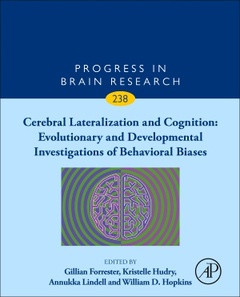Description
Cerebral Lateralization and Cognition: Evolutionary and Developmental Investigations of Behavioral Biases
Evolutionary and Developmental Investigations of Motor Biases
Language: English
Subjects for Cerebral Lateralization and Cognition: Evolutionary and...:
Keywords
<; P>; cerebral lateralization; cognition; framework; behavioural evidenbce; cerebral lateralization<; /P>
457 p. · 19x23.3 cm · Hardback
Description
/li>Contents
/li>Comment
/li>
Cerebral Lateralization and Cognition: Evolutionary and Developmental Investigations of Motor Biases, Volume 238, the latest release in the Progress in Brain Research series, discusses interdisciplinary research on the influence of cerebral lateralization on cognition within an evolutionary framework. Chapters of note in this release include Evolutionary Perspectives: Visual/Motor Biases and Cognition, Manual laterality and cognition through evolution: An archeological perspective, Laterality in insects, Motor asymmetries in fish, amphibians and reptiles, Visual biases and social cognition in animals, Mother and offspring lateralized social interaction across animal species, Manual bias, personality and cognition in common marmosets and other primates, and more.
Part 1. Evolutionary Perspectives: Visual/Motor Biases and Cognition 1. Manual laterality and cognition through evolution: An archeological perspective 2. Laterality in insects 3. Motor asymmetries in fish, amphibians and reptiles 4. The evolution of hemispheric specialization in primates
Part 2. Motor Biases: Social Ability 5. Visual biases and social cognition in animals 6. Mother and offspring lateralised social interaction across animal species 7. Manual bias, personality and cognition in common marmosets and other primates 8. Emotion lateralization in humans 9. Split brain patients: visual biases for faces 10. Cradling behaviour in young children 11. Visual biases and social behaviour in humans and other primates
Part 3. Motor Biases in Typical and Atypical Human Populations 12. Development of motor abilities in typical and atypical populations 13. Atypical lateralization of motor circuit connectivity in autism 14. Infant hand preferences and the development of cognitive abilities: An Evo-Devo approach 15. Hand dominance and cognitive ability – meta analyses 16. Asymmetries during grasping 17. Degree of hand preference for grasping predicts speech articulation competence in children. 18. Rightward shifts in developmental motor connectivity in individuals with ASD 19. Speech lateralisation and motor control 20. Manipulating strength of cerebral lateralization – avenues for intervention
- Presents investigations of cognitive development in an evolutionary framework
- Provides a better understanding of the causal relationship between motor function and brain organization
- Brings clinicians and neuroscientists together to consider the relevance of motor biases as behavioral biomarkers of cognitive disorders
- Includes future possibilities for early detection and motor intervention therapies




